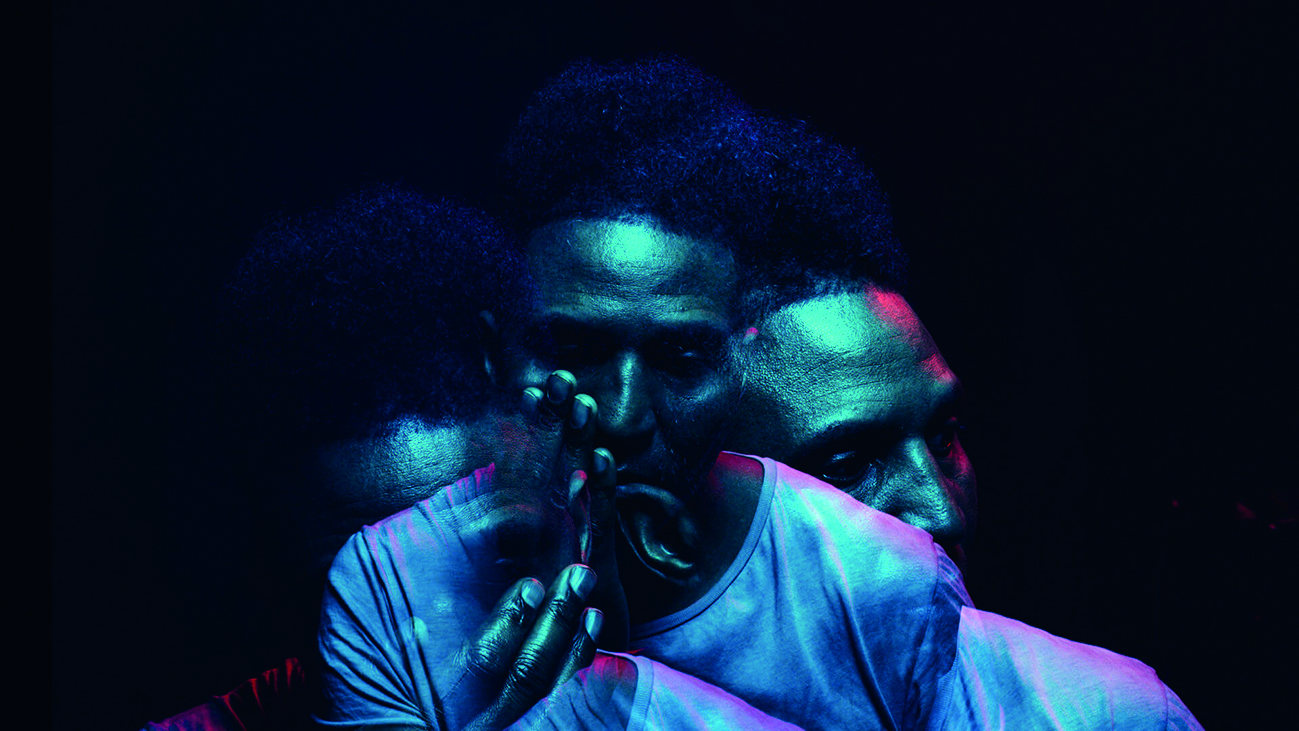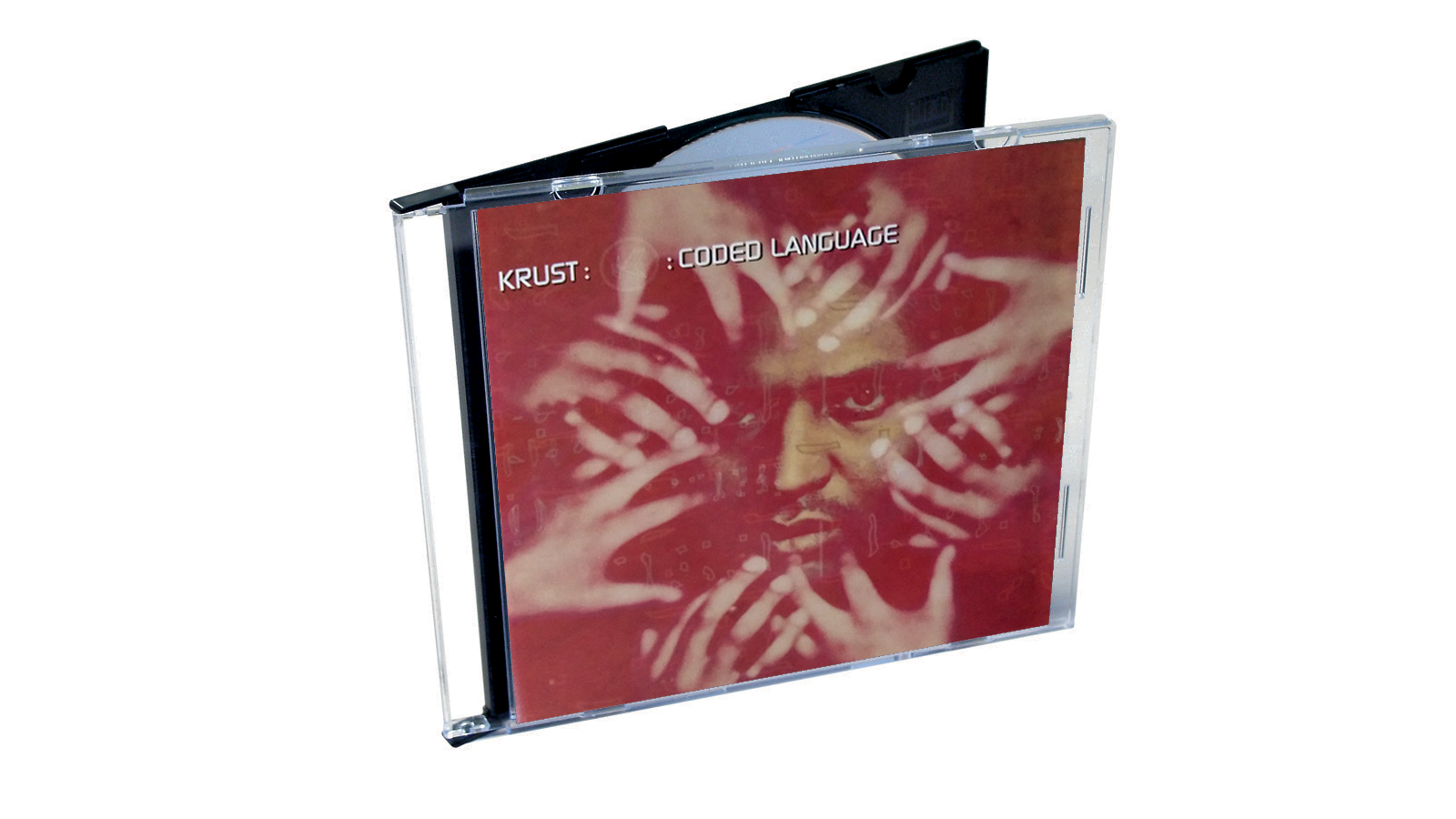Krust on Coded Language: "Jungle was representing the underdogs. There’s millions of us, and we needed a soundtrack. We were just saying f*ck off to everybody who didn’t understand us"
The D'n'B pioneer looks back on one of his most iconic recordings for our Classic Album feature

As the 50-strong string orchestra started to play, Krust welled up. Until then this music had been trapped inside him. He knew what it was that he had wanted to say with this album – the pain, the joy, the struggle he’d been through in getting to this moment.
It was like everything that he’d ever wanted to express effortlessly filled the air, and it was beautiful. “It was like a movie!” says the famed junglist. “The stress that we’ve been through, and all this effort. All of that stuff that we’d put out, these guys started to play back. It was a magical moment. I just burst into tears. It was such a relief.”
This would be his first solo album. And the drum & bass pioneer, who’d helped define the genre through ground-breaking releases with Reprazent, and on the legendary V Recordings, Dope Dragon, and Full Cycle labels, had to dig deep.
“That was the spirit of it: the writing had to really be personal. The storytelling had to be personal. It broke us all in the process.”
Why else are we doing what we’re doing, if you’re not making art for people 10 or 20 years from now?
Helping him tell the story was a tight knit group of close friends and musicians, willing to bare all. String arranger, Simon Hale. Vocalist and songwriter, Morgan. Soul Coughing drummer, Yuval Gabay. Double bass don, Si John. And keys whizz, Mike Crawford. Each opened up, and provided heartfelt loops for Krust to break apart and carefully piece back together.
“I had so much amazing stuff to work with,” he says. The resulting music deconstructed the template of the drum & bass Krust was known for, and fused it with golden era hip-hop swagger, classical music sophistication, film score cinematics, trip-hop depth, and a punk mentality.
We’d survived the Thatcher era, the miner’s strike. The Mods had finally put their hats down, and now it was time for the reign of hip-hop and electronic music
“I was experimenting with everything to help soundtrack what I wanted to get across,” says the Bristol legend. “I just wanted to make a record that was ambitious and different to what I normally did. I had to push the boundaries and just be bold.
Get the MusicRadar Newsletter
Want all the hottest music and gear news, reviews, deals, features and more, direct to your inbox? Sign up here.
“I mean, why else are we doing what we’re doing, if you’re not making art for people 10 or 20 years from now?”

“We used to have a studio in Bristol in a place called the Easton Business Centre by the adventure playground. So, we had a unit in there, and it was quite small, really. I didn’t have a lot of stuff. I had a Moog, an E-Mu e64. The ARP/Solina. The Roland 760 and 550. A big set of Tannoy speakers. A little Mackie desk, and an Atari ST 1040.
“All the vocals and the strings were on ADAT, and you’re syncing it all up with this weird little box, and then pressing play. You had to rewind the tape and then start from the beginning. I remember when I moved to Pro Tools, the amazing thing was that you could start anywhere in a track! But, back then it would have been Cubase.
“Then I used live musicians like samples. I wasn’t musically trained at that time. I got my education through sampling and understanding how to put layers together. And so that’s the way I approached it.”
Coded Language, track by track
High Plains
“I started the track with this cinematic, synth-y, analogue intro. And then it just slams in with this energy that just shakes you up and gets you moving.
“I was thinking about Indiana Jones and the Temple of Doom. That’s how I want my projects to start – bam! With that action sequence vibe where the plane engine fails, then they jump in the dinghy and everyone’s screaming.
“I love that sense that you never know what’s going on, you’re on the edge of your seat, with this sense of wonder and awe. That feeling of insecurity and uncertainty.
“Now, we don’t know where we’re going. We don’t know what’s going to happen next. And it’s too late to turn back now.”
Re-Arrange
“This track is really like a punk tune that just sort of slams in your face, too. And it’s got a very different type of arrangement, as it dismantles song structure and that dancefloor structure, and creates this sort of hybrid animal that also works as a vocal experiment.
“You’ve also got Yuval Gabay’s drums in there. Some sampled drums in there. Some big basslines. And some Si John bass.
“I’m just trying to explore this sort of new territory, and slowly introduce you to this new world.
“Where am I taking you? This is gonna be different, new. This isn’t what you’ve known me for. But, this is where we’re going to explore.”
Tribute
“It’s got big bassline. It’s got that travelling energy to it, and it works. You can still play it today, and it still has an energy to it.
“This was like my sole compromise, where this one is a dancefloor tune. It’s got the elements and all the hallmarks of a banger, you know what I mean?
“I was mindful of trying to keep my regular fans happy, and mindful that some of this album has to be able to be played in clubs, and my own sets. So, I don’t want to go too far down this road, but I do want to keep in the middle. And for me, that was a good compromise.”
Excuses
“This is not obeying the normal rules of dancefloor and club and jungle. It’s pushing the boundaries, again. But it’s sort of a challenging track to me because it’s between a few different ideas and not quite executed to how it could have been. So, yeah, I was never really happy with that song.
“If I could go back I’d definitely change the bass. Oh, definitely. Create something else. I would probably do more to get Mike [Crawford] in to actually play more of the keys while we were doing the track. I just got loads of samples in of what he did.
“I think the drums are really great, though. I love the drums in it.”
Interlude
“This is a very short track. I was there to just really signify that we’re going to go deeper now. We’re going to go to a different phase of the album.
“I like to mess with your senses, and give you a sense of adventure. For me, when I’m writing an album, I’m trying to break you down bit by bit through the album. Trying to get you to leave your present world where it’s safe and familiar. And then come on this journey into my world.
“You want to give the listener the space to relax, and make them feel comfortable. Come along and take you on that journey.”

Overture
“This was that half-time beat. What’s interesting about this was that we mastered that track in Jamaica. We pressed it up as a seven-inch vinyl version over there, because of that different sound that you get when you press in different countries. That was [Talkin’ Loud’s] Paul Martin’s idea.
“This track was Wu-Tang Clan-inspired. I loved them. They soundtracked my early jungle and Full Cycle days. Me and DJ Die would play them all the time as we toured America. So, this track was my sort of hip-hop effort. Just doing something a bit slower, a bit half-time, and a bit phat as well.
“It was mixed in London, and those guys really did make it sound epic, too.”
Coded Language
“This features the slam poet and rapper, Saul Williams. Paul Martin called me and said I had to meet him in London as he was amazing.
“I went up and he’s in the studio and he opens this giant scroll with lyrics on and – bam! Goes into it with that intensity you hear on record. I was blown away. I couldn’t even speak, and I’d never heard anything like that in my life. We got him to the studio in Bristol the next day and he nailed it in two takes.
“There was a line where he said, ‘We decipher a coded language’. And I was like, that’s the fucking title for the track, and for the fucking album as well!”
One Moment
“I was fortunate enough to work with Simon Hale, the string arranger on this track. I remember we had big conversations about the strings. [Album vocalist] Morgan was quite involved in that process as well, given that they are harmonies.
“I wanted to create something that when you listen to it, it will transport you somewhere. At that time, I really was just scratching around trying to find the light in these dark rooms. But when we did the strings with Simon, that was a real shift for me.
“We would start by him reinterpreting what I was doing on keys and stuff with samples. Then he got the full orchestra in Angel Studios in London, which was a very emotional experience.”
Guilty
“For this track I found this JFK sample where he was talking about the opportunity and what’s available. I think that was another of my sort of Wu-Tang inspired tracks. Or at least hip-hop-inspired. It’s a half tempo tune, too.
“And I think that was Morgan at her best on that tune there. She really shone through and everything just seemed to fit together. I think that’s one of the better tracks on the album, structure-wise, everything just fits in that flow. And it’s a good combination between live samples and breaks. Making the track was quite simple and effortless. It was like it wasn’t a real kind of problem at all.”
Spoils of War
“These next few tracks are about the fight, you know? We’d survived the Thatcher era, the miner’s strike. The Mods had finally put their hats down, and now it was time for the reign of hip-hop and electronic music.
“And so there’s big transitions going on in the world. And we were just settling into these eras. The pioneers of jungle music were coming of age. We weren’t kids anymore. We had that warrior spirit, the Navy SEAL mentality. We are gonna fucking get through this and really dig deep.
“It turned out that all of the stuff I was writing in these tunes was actually me sending a letter to my future self.”
Soldiers
“So now it’s like, of course we’re fucking soldiers! We had to have been. For what we had to do to create Full Cycle. Most people would never really get to know that real story. About being part of a grassroots movement, and seeing it through.
“This is what you go through mentally, with the separation, and your family, your friends, your loved ones. The people around who don’t get you, and the strength that you have to embody because you feel lost for a while.
“You think, jeez, I’m making this music. This is what this is, what comes natural to me, and people are hating me for it. And that really is a real test of character. And so, Soldiers is very much talking to that spirit.”
Noble Assassins
“Jungle was representing the underdogs, those noble assassins. There’s millions of us, and we needed a soundtrack. Something to rally to. That’s what punk was about. That’s what Mods were about. Jungle was in exactly the same spirit. It was like we were just saying fuck off to everybody who didn’t understand us.
“It’s about the recognition, and how I’ve grown and become this person. Like, we’re all noble. We’re all assassins. We all have to be capable of upgrading ourselves and finding that fighting spirit, because there’s going to be a time when we need to do that.”
Second Movement
“The final track is a continuation of the Interlude I think, and Guilty. There’s a similar theme going through those three tracks. And yeah, it’s a bit more of like, the conclusion where we’re trying to resolve all of these arguments now.
“I wanted to say that we’re going to leave now with a clearer understanding that there is opportunity out there. There is prosperity to be found. And it’s like we need to win in the mind first. And so let’s settle down. Let’s meditate, visualise. And let’s listen to this last piece of music with that same optimistic view.”
Krust is heading out on tour in March 2022. Visit his website to find out more.


Future Music is the number one magazine for today's producers. Packed with technique and technology we'll help you make great new music. All-access artist interviews, in-depth gear reviews, essential production tutorials and much more. Every marvellous monthly edition features reliable reviews of the latest and greatest hardware and software technology and techniques, unparalleled advice, in-depth interviews, sensational free samples and so much more to improve the experience and outcome of your music-making.










